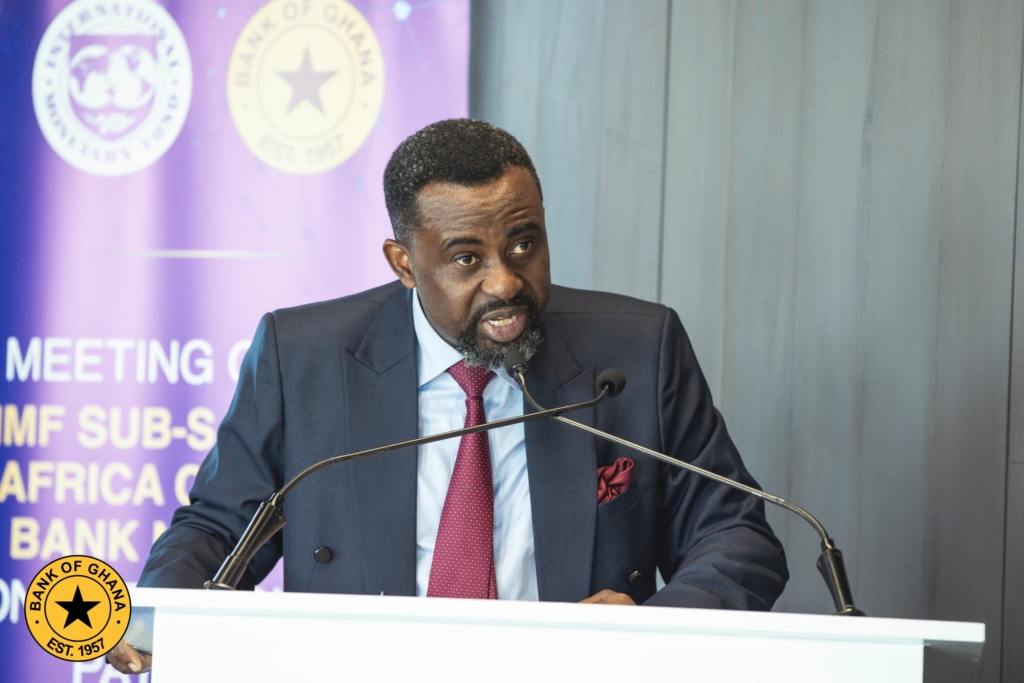We can't stop cryptocurrency use - BoG - MyJoyOnline
The Governor of the Bank of Ghana (BoG), Dr. Johnson Asiama, has declared a pragmatic shift in the nation's approach to cryptocurrencies, stating unequivocally that the central bank cannot stop their use.
Speaking at a Graphic Business/Stanbic Bank Breakfast Meeting on Tuesday, Dr. Asiama emphasised the need for a collaborative regulatory framework to manage the burgeoning digital asset space, rather than attempting to outright ban it.
"Crypto is a big thing in Ghana. We can pretend to look the other way, but the reality is that it's impacting," Dr. Asiama stated.
His comments reflect a growing recognition within Ghana's financial regulatory circles that cryptocurrencies, despite their volatility and associated risks, have become an undeniable part of the global and local financial landscape.
For years, the Bank of Ghana maintained a cautious stance, issuing public notices (such as on January 22, 2018, and March 9, 2022) that cryptocurrencies were not legal tender in Ghana and were not regulated under any domestic law.
Commercial banks and licensed financial institutions were explicitly prohibited from facilitating crypto transactions. This created a regulatory vacuum where crypto activities continued largely in the shadows, unmonitored and without formal consumer protections.
However, Dr. Asiama's recent pronouncements signal a significant policy shift.
"As a regulator, and together with other regulators such as the Securities and Exchange Commission (SEC), GRA [Ghana Revenue Authority] and others, we are joining efforts to engage in regulating that activity and to ensure that the benefits accrue to us while minimising the risks," he elaborated.
He likened cryptocurrency to a ubiquitous force, stating, "A friend of mine said, 'crypto is like the air we breathe.' You can't stop it. It goes everywhere. It takes place everywhere, and so all you have to do is to develop the systems to be able to minimise the risks and allow these to play out."
The BoG's shift towards regulation is not entirely new but represents an acceleration of previously hinted-at intentions.
In August 2024, the Bank of Ghana issued draft regulatory guidelines on digital assets, proposing measures such as mandatory registration for Virtual Asset Service Providers (VASPs), anti-money laundering (AML) compliance obligations, and strict internal control systems.
These guidelines acknowledged the innovative potential of digital assets in areas like cross-border payments, remittances, and crowdfunding, while also highlighting risks such as money laundering, terrorism financing, fraud, and consumer protection issues.
More recently, at the African Leaders and Partners Forum 2025 in Washington, D.C., Dr. Asiama announced the central bank's intention to commence full regulation of virtual assets by the end of September 2025, contingent on the passage of a Virtual Asset Service Providers (VASP) Act.
This proposed legislation would empower the BoG to license and supervise entities operating in the digital asset space and facilitate joint oversight with the SEC.
To support this, the Bank of Ghana plans to establish a specialised unit dedicated to the supervision and regulation of digital assets.
This move aligns Ghana with a growing trend among African nations. Countries like Nigeria and South Africa have already made significant strides in crypto regulation, with South Africa having licensed over 240 crypto firms since making its own regulatory framework.
The push for regulation is partly driven by international pressure, particularly from the Financial Action Task Force (FATF), which requires member states to implement anti-money laundering and counter-terrorist financing measures for VASPs to avoid being grey-listed and maintain credibility with global financial institutions.
Regulating cryptocurrencies presents a unique set of challenges, especially for developing economies.
The decentralised and often anonymous nature of virtual assets can complicate oversight, raising concerns about illicit financial flows, including money laundering and terrorist financing. Consumer protection is another significant hurdle, given the high volatility of crypto markets and the prevalence of scams.
While Ghana has also been exploring the development of its own Central Bank Digital Currency (CBDC), the "eCedi," which is currently in its pilot phase, Dr. Asiama's latest remarks underscore that the focus is now equally on embracing and regulating existing private cryptocurrencies.
The coming months will be crucial as Ghana prepares to roll out its comprehensive VASP law, aiming to strike a balance between harnessing the innovative potential of digital assets and safeguarding its financial system.
Despite these challenges, a well-designed regulatory framework offers substantial benefits. It can:
The Views, Comments, Opinions, Contributions and Statements made by Readers and Contributors on this platform do not necessarily represent the views or policy of Multimedia Group Limited.
The Views, Comments, Opinions, Contributions and Statements made by Readers and Contributors on this platform do not necessarily represent the views or policy of Multimedia Group Limited.
You may also like...
Diddy's Legal Troubles & Racketeering Trial

Music mogul Sean 'Diddy' Combs was acquitted of sex trafficking and racketeering charges but convicted on transportation...
Thomas Partey Faces Rape & Sexual Assault Charges

Former Arsenal midfielder Thomas Partey has been formally charged with multiple counts of rape and sexual assault by UK ...
Nigeria Universities Changes Admission Policies

JAMB has clarified its admission policies, rectifying a student's status, reiterating the necessity of its Central Admis...
Ghana's Economic Reforms & Gold Sector Initiatives

Ghana is undertaking a comprehensive economic overhaul with President John Dramani Mahama's 24-Hour Economy and Accelera...
WAFCON 2024 African Women's Football Tournament

The 2024 Women's Africa Cup of Nations opened with thrilling matches, seeing Nigeria's Super Falcons secure a dominant 3...
Emergence & Dynamics of Nigeria's ADC Coalition

A new opposition coalition, led by the African Democratic Congress (ADC), is emerging to challenge President Bola Ahmed ...
Demise of Olubadan of Ibadanland
Oba Owolabi Olakulehin, the 43rd Olubadan of Ibadanland, has died at 90, concluding a life of distinguished service in t...
Death of Nigerian Goalkeeping Legend Peter Rufai

Nigerian football mourns the death of legendary Super Eagles goalkeeper Peter Rufai, who passed away at 61. Known as 'Do...


